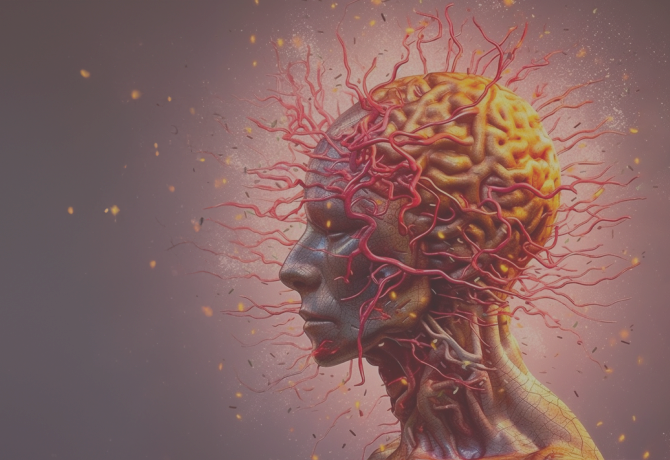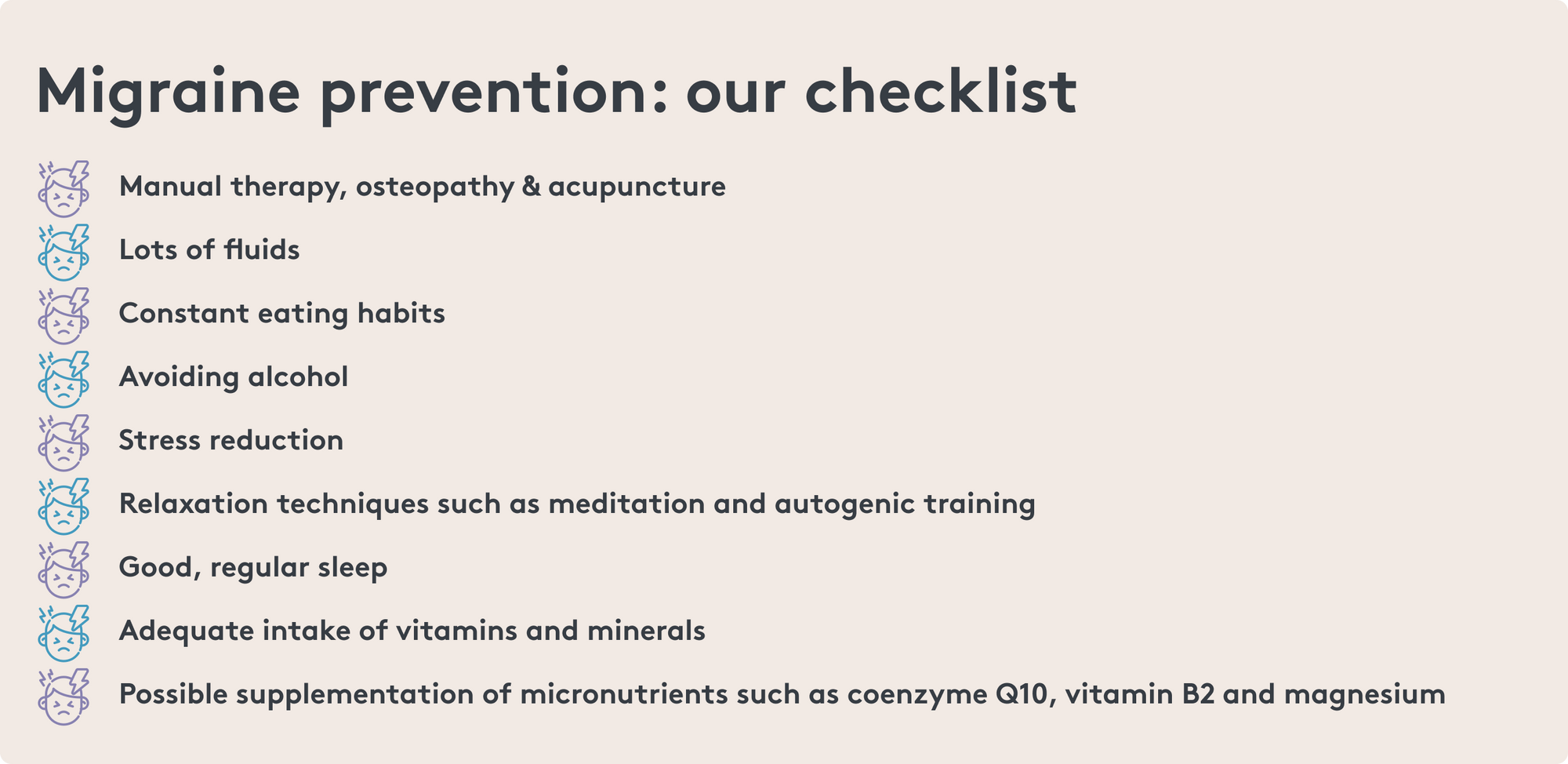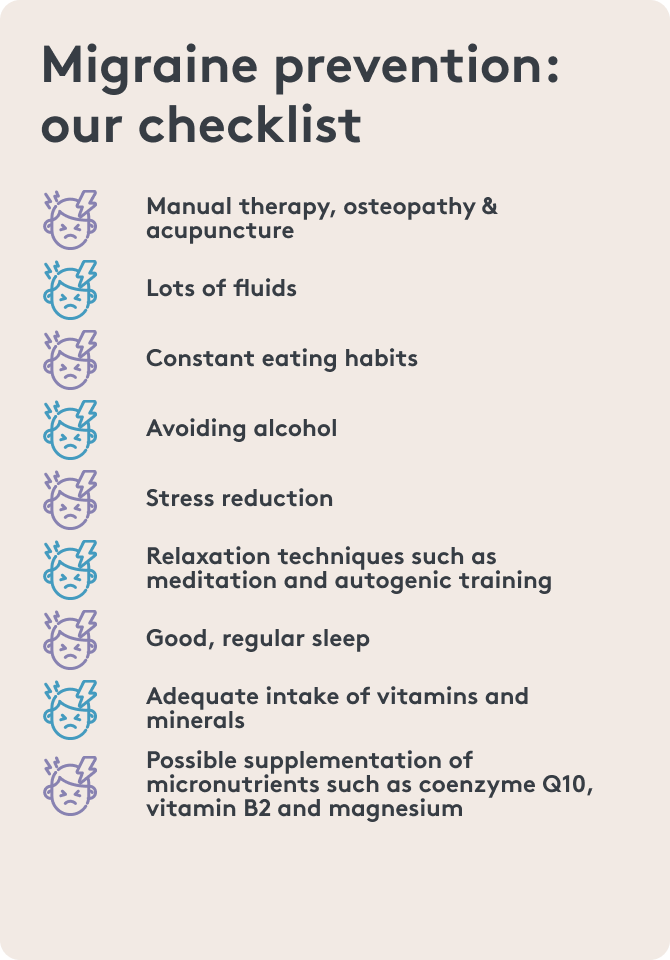Themen dieses Blogartikels:
Introduction
Migraine: Causes, Symptoms and Relief
We all probably know at least one person in our environment who suffers from migraine. At least that is very likely, because according to statistics from the RKI from 2020, 14.8 percent of women and 6 percent of men in Germany meet all the criteria for a migraine1.
So it's no wonder that this topic comes up again and again in magazines, on social media, or even among friends and family - what's frightening, however, is how poorly educated people have been about this condition up until now.
We're changing that today: In this article, you'll learn more about the disease migraine, its manifestations and possibilities of treatment as well as migraine prevention.
First of all, an important information: this article is not intended to replace a medical consultation, it is only meant to be a source of information.
So it's no wonder that this topic comes up again and again in magazines, on social media, or even among friends and family - what's frightening, however, is how poorly educated people have been about this condition up until now.
We're changing that today: In this article, you'll learn more about the disease migraine, its manifestations and possibilities of treatment as well as migraine prevention.
First of all, an important information: this article is not intended to replace a medical consultation, it is only meant to be a source of information.
Knowledge for your ears!
No time to read? Here you can listen to Claire's article.
What is migraine?
Migraines and headaches are often equated and downplayed - wrongly! In fact, the typical pulsating, one-sided migraine headache is just one symptom of many. Unlike normal headaches (for example tension headaches), the cause of migraine is more diffuse and the clinical picture more severe.
Patients have recurrent migraine attacks, also called migraine attacks. The frequency and severity vary from person to person, and the duration of an attack is typically between 4 and 72 hours.
Patients have recurrent migraine attacks, also called migraine attacks. The frequency and severity vary from person to person, and the duration of an attack is typically between 4 and 72 hours.
Migraine: symptoms
Migraine is classified into migraine with and without aura. Classic migraine without aura is characterized by headaches, nausea, vomiting, sensitivity to sound and light. However, not all symptoms have to occur in all individuals.
In migraine with aura, additional neurological symptoms occur. These include intermittent hemiplegia, speech disorders, and paresthesias, which are sensory disturbances such as tingling or numbness. Flashes of vision or flickering are also indicative of migraine with aura.
Additionally, one can further distinguish and refer to migraine as vestibular migraine or menstrual migraine. In vestibular migraine, dizziness and a certain disorientation are particularly pronounced. Menstrual migraine usually occurs in combination with menstruation in female sufferers.
Any person affected by migraines has surely often asked themselves, "Why me?" The causes of migraines are actually diverse, as are the triggers of a migraine attack.
In migraine with aura, additional neurological symptoms occur. These include intermittent hemiplegia, speech disorders, and paresthesias, which are sensory disturbances such as tingling or numbness. Flashes of vision or flickering are also indicative of migraine with aura.
Additionally, one can further distinguish and refer to migraine as vestibular migraine or menstrual migraine. In vestibular migraine, dizziness and a certain disorientation are particularly pronounced. Menstrual migraine usually occurs in combination with menstruation in female sufferers.
Any person affected by migraines has surely often asked themselves, "Why me?" The causes of migraines are actually diverse, as are the triggers of a migraine attack.
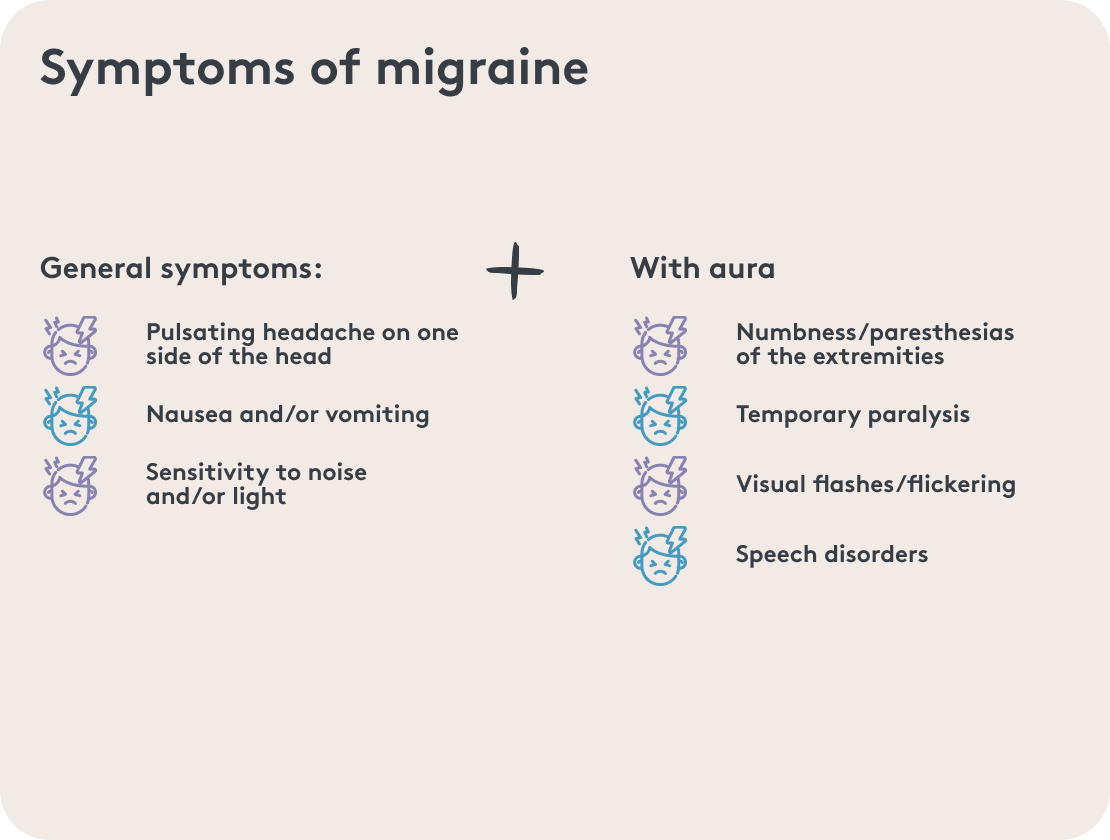

Migraine causes and triggers: genetics, hormonal fluctuations, environmental factors
The causes of migraine are not fully understood and probably vary widely. A genetic component and an influence of hormones are suspected. This is likely, since women are significantly more likely to be migraine patients than men. The biggest influence, however, is probably the environment, i.e. eating habits, stress, trauma, emotional events such as a separation of parents or the death of a relative, and much more.
But what you're probably also wondering is: What actually happens during a migraine attack that causes such severe symptoms? Here, too, science is not in complete agreement.
But this much is clear: migraine is a disease in which there is a dysregulation of pain sensation and inflammation. An attack probably originates from the so-called migraine center in the brain stem. The neurons located here are overactive and then lead to the above-mentioned dysregulation via cranial nerves. Transmitters and neuropeptides are released at the blood vessels involved in the cerebral membranes, causing vasodilatation and immigration of inflammatory cells and fluid into the tissue. Local inflammation develops, and the pain continues to intensify.
But what you're probably also wondering is: What actually happens during a migraine attack that causes such severe symptoms? Here, too, science is not in complete agreement.
But this much is clear: migraine is a disease in which there is a dysregulation of pain sensation and inflammation. An attack probably originates from the so-called migraine center in the brain stem. The neurons located here are overactive and then lead to the above-mentioned dysregulation via cranial nerves. Transmitters and neuropeptides are released at the blood vessels involved in the cerebral membranes, causing vasodilatation and immigration of inflammatory cells and fluid into the tissue. Local inflammation develops, and the pain continues to intensify.
However, such attacks usually do not come out of the blue, but announce themselves. They are initiated by so-called triggers.
Common triggers are lack of sleep, stress, a change in caffeine consumption, an unhealthy diet, bright lights, loud noises, weather changes and hormonal changes, for example in the case of menstrual migraine. In histamine-sensitive individuals with migraine, increased histamine intake can also trigger a migraine attack. Glutamate, aspartate and nitrite are similar.
So what can help you if you have an acute migraine or want to prevent the next one?
Common triggers are lack of sleep, stress, a change in caffeine consumption, an unhealthy diet, bright lights, loud noises, weather changes and hormonal changes, for example in the case of menstrual migraine. In histamine-sensitive individuals with migraine, increased histamine intake can also trigger a migraine attack. Glutamate, aspartate and nitrite are similar.
So what can help you if you have an acute migraine or want to prevent the next one?
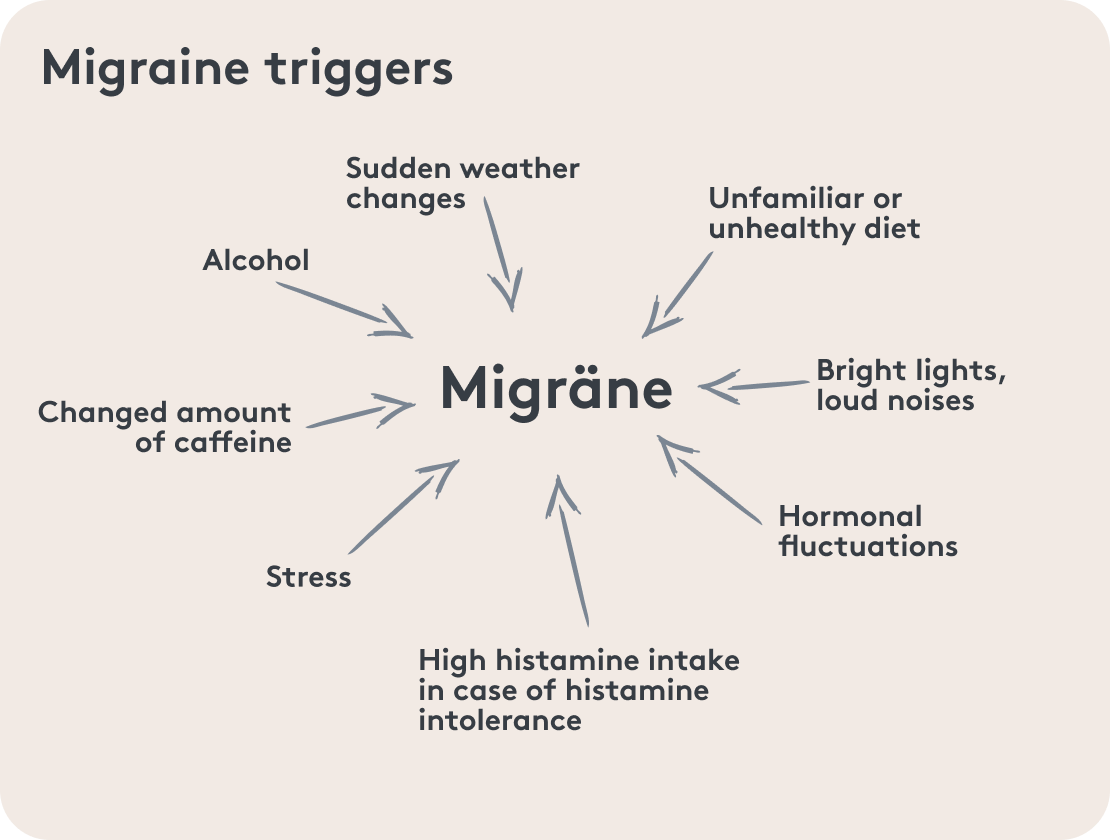

What to do about migraine?
Probably the easiest thing you can do is to write in a migraine diary. This will give you clues about potential triggers that you should avoid from now on in order to prevent migraine attacks. Furthermore, it is generally beneficial to avoid stress as much as possible and follow a consistent diet.
Otherwise, there are a lot of theories, guides and instructions on how patients should behave and what they should take. Whether and when painkillers are useful, which foods are a no-go and whether coffee is good or bad - opinions differ. Today, we would like to focus on one aspect in particular: the influence of supplements on migraine.
Otherwise, there are a lot of theories, guides and instructions on how patients should behave and what they should take. Whether and when painkillers are useful, which foods are a no-go and whether coffee is good or bad - opinions differ. Today, we would like to focus on one aspect in particular: the influence of supplements on migraine.
Can dietary supplements help with migraines?
Opinions on supplements are divided: some swear by them, others think nothing of supplementation. Wherever you stand, today we're going to take a look at what they can do when it comes to migraines.
Magnesium against migraine?
Some patients swear by magnesium for migraine and studies have also looked into this.
In fact, the assumption that magnesium helps with migraine is based on the fact that magnesium levels in migraine patients are often lower than in control groups2,3. This may lead to constant overactivation due to increased glutamate release, as well as a tendency for inflammation of the nervous system4. Studies on ingestion come to mixed results regarding the effect of magnesium in migraine.
For example, a study of 81 patients5 showed that taking 600 mg of magnesium citrate for 12 weeks resulted in a 41.6 percent reduction in attack frequency in the magnesium group. In the control group, there was a reduction of 15.8 percent. Thus, taking magnesium proved helpful in terms of frequency reduction.
Another paper from 20196 shed a somewhat different light on the situation. According to this analysis with just over 90 patients, it appeared that there was no significant reduction in either frequency or severity. Further studies were needed to draw conclusions about efficacy, according to this analysis.
A larger analysis with 11 investigated studies on intravenous magnesium and 10 studies on oral magnesium again had positive things to report7. Not only the frequency but also the intensity could be improved with oral magnesium administration - and intravenous magnesium for acute migraine also showed promising results.
All in all, even science is not in agreement, but there is a tendency to attribute a positive effect to magnesium. Hopefully, in the future, larger and more conclusive studies will follow.
In fact, the assumption that magnesium helps with migraine is based on the fact that magnesium levels in migraine patients are often lower than in control groups2,3. This may lead to constant overactivation due to increased glutamate release, as well as a tendency for inflammation of the nervous system4. Studies on ingestion come to mixed results regarding the effect of magnesium in migraine.
For example, a study of 81 patients5 showed that taking 600 mg of magnesium citrate for 12 weeks resulted in a 41.6 percent reduction in attack frequency in the magnesium group. In the control group, there was a reduction of 15.8 percent. Thus, taking magnesium proved helpful in terms of frequency reduction.
Another paper from 20196 shed a somewhat different light on the situation. According to this analysis with just over 90 patients, it appeared that there was no significant reduction in either frequency or severity. Further studies were needed to draw conclusions about efficacy, according to this analysis.
A larger analysis with 11 investigated studies on intravenous magnesium and 10 studies on oral magnesium again had positive things to report7. Not only the frequency but also the intensity could be improved with oral magnesium administration - and intravenous magnesium for acute migraine also showed promising results.
All in all, even science is not in agreement, but there is a tendency to attribute a positive effect to magnesium. Hopefully, in the future, larger and more conclusive studies will follow.
Coenzyme Q10 & vitamin B2
Coenzyme Q10 and vitamin B2 (riboflavin) are both substances with antioxidant capacity, which means they can help reduce oxidative stress in your cells. Both are found particularly within the mitochondria - coenzyme Q10 is a cofactor in the respiratory chain and riboflavin is part of a reduction equivalent of the energy metabolism. Roughly speaking, these are endogenous antioxidants for our cellular powerhouses.
The basis for the assumption that these two antioxidants can help in migraine is the observation that migraine patients usually have increased levels of oxidative stress and a lower antioxidant capacity, respectively8. And indeed, there is evidence of benefit from coenzyme Q10 and vitamin B2.
For example, a meta-analysis on the use of coenzyme Q10 with 371 included patients9 concludes that coenzyme Q10, similar to magnesium, reduces the frequency of migraine attacks. Coenzyme Q10 also had a small but significant effect on the length of a migraine attack in this analysis.
The basis for the assumption that these two antioxidants can help in migraine is the observation that migraine patients usually have increased levels of oxidative stress and a lower antioxidant capacity, respectively8. And indeed, there is evidence of benefit from coenzyme Q10 and vitamin B2.
For example, a meta-analysis on the use of coenzyme Q10 with 371 included patients9 concludes that coenzyme Q10, similar to magnesium, reduces the frequency of migraine attacks. Coenzyme Q10 also had a small but significant effect on the length of a migraine attack in this analysis.
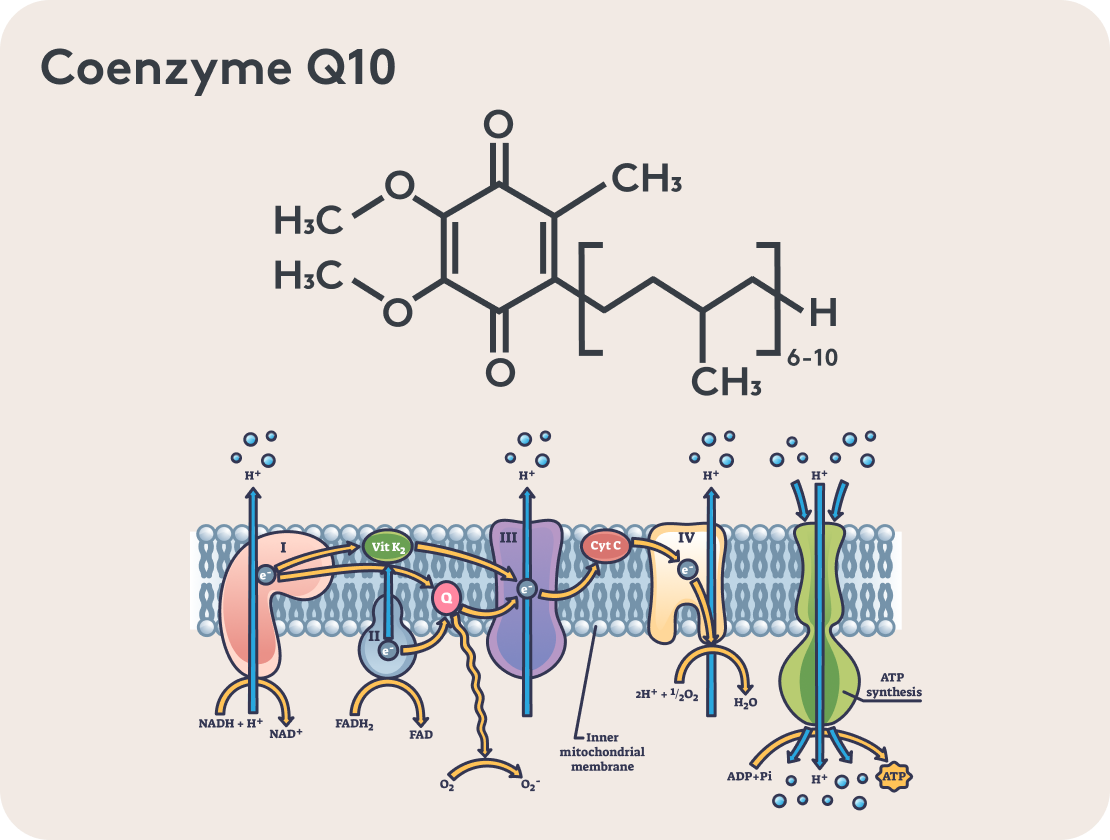

Regarding riboflavin, a few studies also describe a positive effect. For example, a meta-analysis with a total of 673 participants showed that a three-month intake of 400 mg vitamin B2 per day was associated with a significant improvement in duration, frequency, and experienced pain10.
Of course, the following applies to both coenzyme Q10 and riboflavin:
Overall, there are currently still very few studies or analyses that examine the influence of these micronutrients on migraine. Therefore, no clear recommendation can be made. What is certain, however, is that both substances are definitely worth being tried out for a few months in comparable doses due to their low side effects and good tolerability.
Of course, the following applies to both coenzyme Q10 and riboflavin:
Overall, there are currently still very few studies or analyses that examine the influence of these micronutrients on migraine. Therefore, no clear recommendation can be made. What is certain, however, is that both substances are definitely worth being tried out for a few months in comparable doses due to their low side effects and good tolerability.
What else helps against migraine?
In addition to nutritional supplements, let's take a quick look at other migraine remedies: relaxation techniques such as meditation or autogenic training as well as sufficient sleep are particularly important in the fight against migraine. Acupuncture, osteopathy or physiotherapy can also be helpful.
Even more important than taking or doing something in an acute situation can be a suitable routine for prevention. What can this look like?
Even more important than taking or doing something in an acute situation can be a suitable routine for prevention. What can this look like?
How can you prevent migraines?
Regular acupuncture or osteopathy sessions as well as relaxation techniques and sleep are of course also part of prevention - as, by the way, are most of the micronutrients presented above. What continues to be important, like always, is a healthy diet, sufficient exercise and plenty of fluids. In this case, a healthy diet naturally also means avoiding foods that act as triggers.
Conclusion
Find a holistic approach to prevent and treat your migraines
In the end, each of us is different. What works miracles for one person may not help another at all. So listen to your body to find your own personal routine both in prevention and in acute situations.
In any case, it can be helpful to resort to holistic and non-drug methods such as nutritional supplements, osteopathy or acupuncture to counter a migraine attack as holistically as possible and support your own body.
In any case, it can be helpful to resort to holistic and non-drug methods such as nutritional supplements, osteopathy or acupuncture to counter a migraine attack as holistically as possible and support your own body.
bibliography
1 Porst, M., Wengler, A., Leddin, J., Neuhauser, H., Katsarava, Z., von der Lippe, E., Anton, A., Ziese, T., & Rommel, A. (2020). Migräne und Spannungskopfschmerz in Deutschland. Prävalenz und Erkrankungsschwere im Rahmen der Krankheitslast-Studie BURDEN 2020. https://doi.org/10.25646/6988.2
2 Gallai, V., Sarchielli, P., Coata, G., Firenze, C., Morucci, P., & Abbritti, G. (1992). Serum and salivary magnesium levels in migraine. Results in a group of juvenile patients. Headache, 32(3), 132–135. https://doi.org/10.1111/j.1526- 4610.1992.hed3203132.x
3 Gallai, V., Sarchielli, P., Morucci, P., & Abbritti, G. (1993). Red blood cell magnesium levels in migraine patients. Cephalalgia : an international journal of headache, 13(2), 94–73. https://doi.org/10.1046/j.1468-2982.1993.1302094.x
4 Maier, J. A. M., Locatelli, L., Fedele, G., Cazzaniga, A., & Mazur, A. (2022). Magnesium and the Brain: A Focus on Neuroinflammation and Neurodegeneration. International journal of molecular sciences, 24(1), 223. https://doi.org/10.3390/ijms24010223
5 Peikert, A., Wilimzig, C., Köhne-Volland, R. (1996). Prophylaxis of Migraine with Oral Magnesium: Results From A Prospective, Multi-Center, Placebo-Controlled and Double-Blind Randomized Study. Cephalalgia, 16(4), 257-263. doi:10.1046/j.1468-2982.1996.1604257.x
6 Okoli, G. N., Rabbani, R., Kashani, H. H., Wierzbowski, A. K., Neilson, C., Mansouri, B., Zarychanski, R., & Abou- Setta, A. M. (2019). Vitamins and Minerals for Migraine Prophylaxis: A Systematic Review and Meta-analysis. The Canadian journal of neurological sciences. Le journal canadien des sciences neurologiques, 46(2), 224–233. https://doi.org/10.1017/cjn.2018.394
7 Chiu, H. Y., Yeh, T. H., Huang, Y. C., & Chen, P. Y. (2016). Effects of Intravenous and Oral Magnesium on Reducing Migraine: A Meta-analysis of Randomized Controlled Trials. Pain physician, 19(1), E97–E112.
8 Malkki, H. (2015). Chronic migraine linked to reduced antioxidant capacity. Nat Rev Neurol, 11, 426. https://doi.org/10.1038/nrneurol.2015.125
9 Sazali, S., Badrin, S., Norhayati, M. N., & Idris, N. S. (2021). Coenzyme Q10 supplementation for prophylaxis in adult patients with migraine-a meta-analysis. BMJ open, 11(1), e039358. https://doi.org/10.1136/bmjopen-2020-039358#
10 Chen, Y. S., Lee, H. F., Tsai, C. H., Hsu, Y. Y., Fang, C. J., Chen, C. J., Hung, Y. H., & Hu, F. W. (2022). Effect of Vitamin B2 supplementation on migraine prophylaxis: a systematic review and meta-analysis. Nutritional neuroscience, 25(9), 1801–1812. https://doi.org/10.1080/1028415X.2021.1904542
2 Gallai, V., Sarchielli, P., Coata, G., Firenze, C., Morucci, P., & Abbritti, G. (1992). Serum and salivary magnesium levels in migraine. Results in a group of juvenile patients. Headache, 32(3), 132–135. https://doi.org/10.1111/j.1526- 4610.1992.hed3203132.x
3 Gallai, V., Sarchielli, P., Morucci, P., & Abbritti, G. (1993). Red blood cell magnesium levels in migraine patients. Cephalalgia : an international journal of headache, 13(2), 94–73. https://doi.org/10.1046/j.1468-2982.1993.1302094.x
4 Maier, J. A. M., Locatelli, L., Fedele, G., Cazzaniga, A., & Mazur, A. (2022). Magnesium and the Brain: A Focus on Neuroinflammation and Neurodegeneration. International journal of molecular sciences, 24(1), 223. https://doi.org/10.3390/ijms24010223
5 Peikert, A., Wilimzig, C., Köhne-Volland, R. (1996). Prophylaxis of Migraine with Oral Magnesium: Results From A Prospective, Multi-Center, Placebo-Controlled and Double-Blind Randomized Study. Cephalalgia, 16(4), 257-263. doi:10.1046/j.1468-2982.1996.1604257.x
6 Okoli, G. N., Rabbani, R., Kashani, H. H., Wierzbowski, A. K., Neilson, C., Mansouri, B., Zarychanski, R., & Abou- Setta, A. M. (2019). Vitamins and Minerals for Migraine Prophylaxis: A Systematic Review and Meta-analysis. The Canadian journal of neurological sciences. Le journal canadien des sciences neurologiques, 46(2), 224–233. https://doi.org/10.1017/cjn.2018.394
7 Chiu, H. Y., Yeh, T. H., Huang, Y. C., & Chen, P. Y. (2016). Effects of Intravenous and Oral Magnesium on Reducing Migraine: A Meta-analysis of Randomized Controlled Trials. Pain physician, 19(1), E97–E112.
8 Malkki, H. (2015). Chronic migraine linked to reduced antioxidant capacity. Nat Rev Neurol, 11, 426. https://doi.org/10.1038/nrneurol.2015.125
9 Sazali, S., Badrin, S., Norhayati, M. N., & Idris, N. S. (2021). Coenzyme Q10 supplementation for prophylaxis in adult patients with migraine-a meta-analysis. BMJ open, 11(1), e039358. https://doi.org/10.1136/bmjopen-2020-039358#
10 Chen, Y. S., Lee, H. F., Tsai, C. H., Hsu, Y. Y., Fang, C. J., Chen, C. J., Hung, Y. H., & Hu, F. W. (2022). Effect of Vitamin B2 supplementation on migraine prophylaxis: a systematic review and meta-analysis. Nutritional neuroscience, 25(9), 1801–1812. https://doi.org/10.1080/1028415X.2021.1904542
